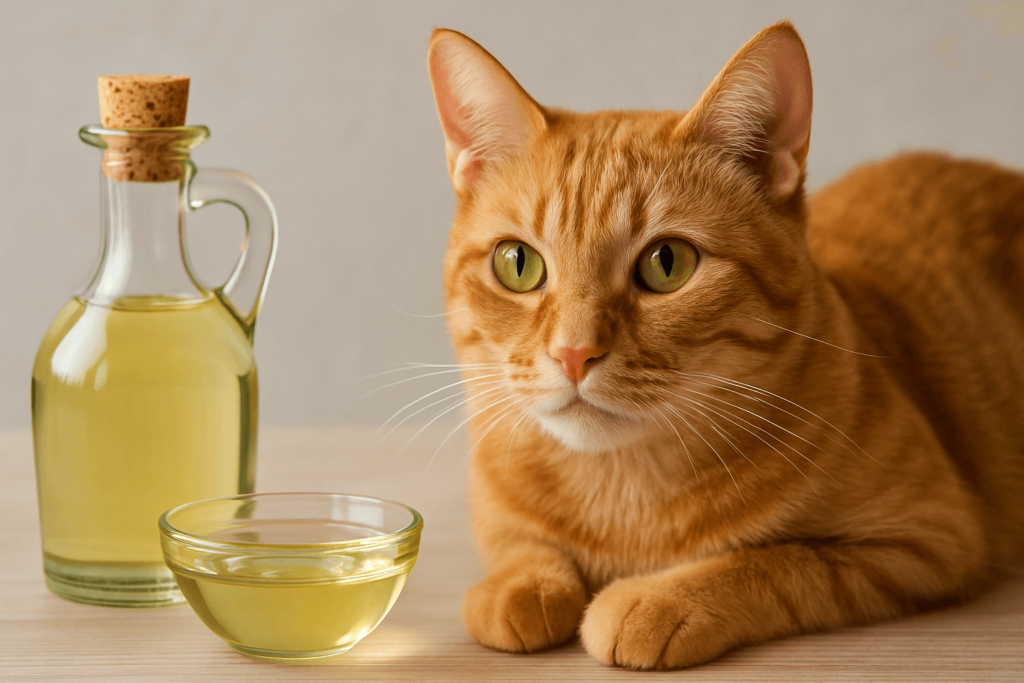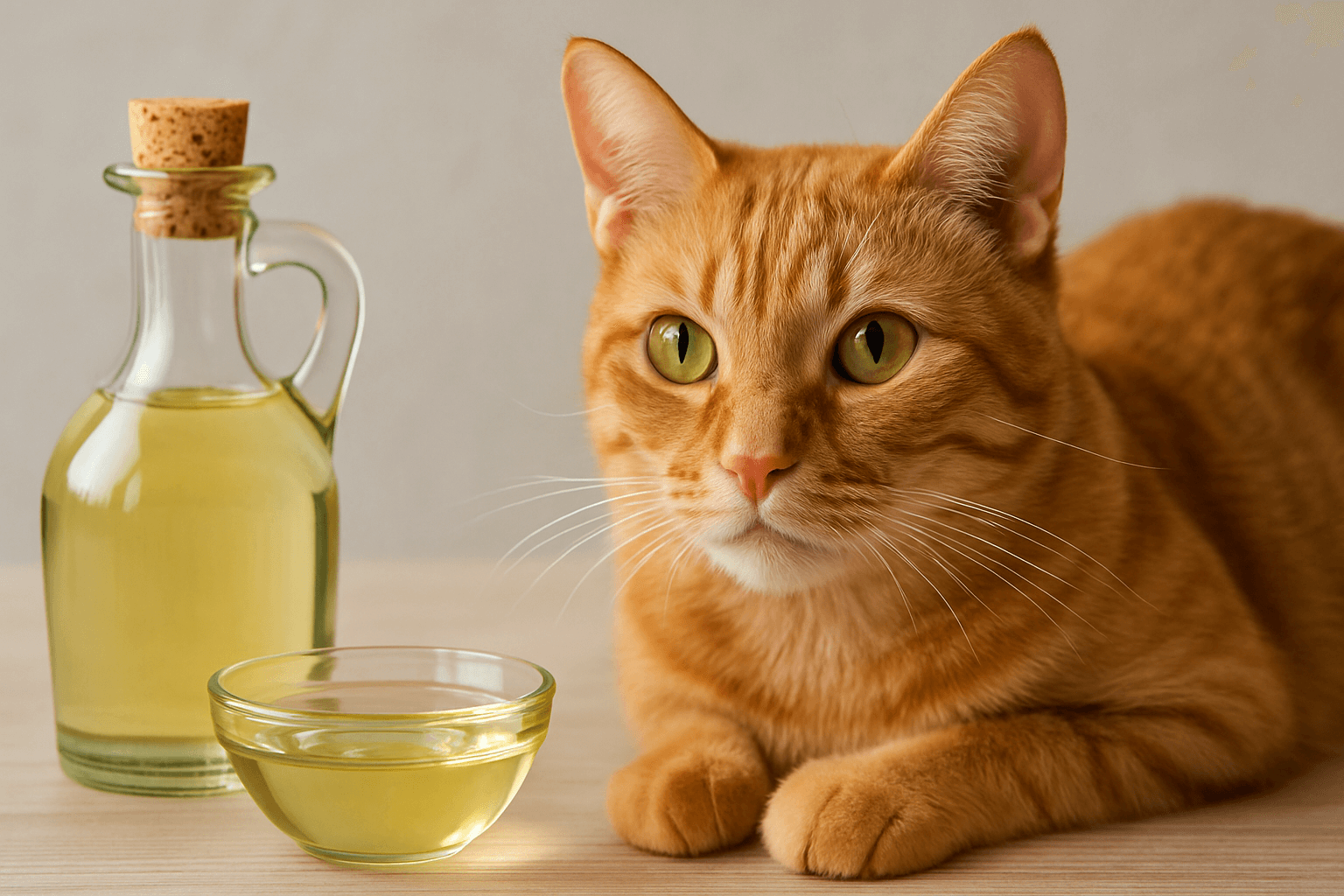Is Mineral Oil Safe for Cats?
Mineral oil is a common household item often used for various purposes, from lubrication to skincare. However, when it comes to our feline friends, pet owners must exercise caution before using any product not specifically designed for cats. While mineral oil can be beneficial in certain situations, improper use or accidental ingestion may pose risks to your cat’s health. Understanding its safety, potential benefits, and risks is essential for ensuring your cat’s well-being. In this blog post, we’ll explore everything you need to know about mineral oil and its impact on cats, providing expert guidance to help you make informed decisions.
Potential Uses of Mineral Oil for Cats
When used correctly and under veterinary supervision, mineral oil can serve specific purposes in feline care. Here are some scenarios where it might be applied safely.
Treating Hairballs:
Mineral oil is sometimes recommended as a laxative to help cats pass hairballs more easily by lubricating the digestive tract.Moisturizing Dry Skin:
Applied topically in small amounts, mineral oil can soften dry or flaky skin, though this should only be done with professional advice.Cleaning Ears Safely:
A diluted solution of mineral oil may help loosen earwax buildup in cats, making it easier to clean their ears gently.Removing Sticky Substances:
If your cat gets sap, glue, or other sticky substances on their fur, mineral oil can help dissolve and remove these without irritating the skin.Preventing Constipation:
In rare cases, veterinarians may suggest mineral oil to relieve mild constipation, but this should never be done without consulting an expert.
While mineral oil has practical applications, it’s crucial to proceed with caution and always seek professional guidance before using it on your cat.

Risks of Using Mineral Oil for Cats
Despite its potential benefits, mineral oil carries significant risks if misused or ingested accidentally. Understanding these dangers helps prevent harm to your pet.
Aspiration Risk:
If mineral oil is swallowed, it can enter the lungs during vomiting or regurgitation, leading to serious respiratory issues like pneumonia.Digestive Upset:
Excessive use of mineral oil may interfere with nutrient absorption in the intestines, causing diarrhea or malnutrition over time.Toxicity Concerns:
Some mineral oils contain additives that are unsafe for cats, so using food-grade options is critical if approved by a vet.Skin Irritation:
Prolonged or excessive topical application can irritate sensitive skin, especially in cats with allergies or pre-existing conditions.Unintended Side Effects:
Even when used correctly, mineral oil may cause unexpected reactions, such as lethargy or changes in appetite, requiring immediate attention.
These risks highlight the importance of consulting a veterinarian before introducing mineral oil into your cat’s care routine.
Check this guide 👉CBD Oil for Cats: Best 7 Expert Tips!
Check this guide 👉Can Cats Eat Fish Oil? Best 7 Expert Tips!
Check this guide 👉Can Cats Eat Vitamin E Oil? Best 7 Expert Tips!
Safe Uses of Mineral Oil for Cats | Potential Risks of Mineral Oil for Cats |
|---|---|
Helping pass hairballs | Aspiration into the lungs |
Removing sticky substances | Interference with nutrient absorption |
Cleaning ears (under vet guidance) | Skin irritation or allergic reactions |
Moisturizing dry skin temporarily | Toxicity from non-food-grade products |
Relieving mild constipation | Unintended side effects like lethargy |
How to Use Mineral Oil Safely Around Cats
If you decide to use mineral oil for your cat, following proper guidelines ensures their safety and minimizes risks. Here are some tips to keep in mind.
Consult Your Veterinarian First:
Always seek professional advice before using mineral oil to confirm it’s appropriate for your cat’s specific needs.Use Only Food-Grade Mineral Oil:
Ensure the product is free of harmful additives and safe for consumption if there’s any chance of ingestion.Administer Small Amounts Carefully:
If approved by your vet, give only the recommended dosage to avoid complications like aspiration or digestive upset.Avoid Direct Inhalation:
Keep mineral oil away from your cat’s face to reduce the risk of inhalation, which can lead to respiratory problems.Monitor for Adverse Reactions:
Watch for signs of distress, such as coughing, vomiting, or changes in behavior, and contact your vet immediately if they occur.
By adhering to these precautions, you can minimize potential hazards while maximizing the benefits of mineral oil for your cat.
Alternatives to Mineral Oil for Common Cat Issues
If you’re hesitant about using mineral oil, several safer alternatives exist for addressing common feline concerns. These options provide peace of mind while promoting your cat’s health.
Hairball Remedies:
Specialized hairball gels or fiber-rich diets are designed specifically for cats and carry fewer risks than mineral oil.Ear Cleaning Solutions:
Veterinary-approved ear cleaners are formulated to safely dissolve wax without risking irritation or toxicity.Natural Moisturizers:
Coconut oil or hypoallergenic pet moisturizers can hydrate dry skin without the potential side effects of mineral oil.Constipation Treatments:
Pumpkin puree or probiotics are gentle, natural remedies that support digestive health without compromising nutrient absorption.Sticky Substance Removers:
Pet-safe degreasers or cornstarch can effectively remove sticky residues without exposing your cat to harmful chemicals.
These alternatives offer safer and more reliable solutions for many issues mineral oil might otherwise address.
Signs Your Cat May Be Sensitive to Mineral Oil
Some cats may exhibit sensitivity or adverse reactions to mineral oil, even when used cautiously. Recognizing these signs early allows you to take prompt action.
Respiratory Symptoms:
Coughing, wheezing, or difficulty breathing may indicate aspiration or lung irritation.Gastrointestinal Issues:
Diarrhea, vomiting, or loss of appetite could signal digestive upset caused by mineral oil.Lethargy or Weakness:
Unusual tiredness or lack of energy may suggest systemic reactions to the substance.Skin Redness or Itching:
Topical use may cause redness, swelling, or scratching if your cat has sensitive skin.Changes in Behavior:
Hiding, aggression, or restlessness may indicate discomfort or illness related to mineral oil exposure.
Monitoring your cat closely after using mineral oil helps identify potential sensitivities and ensures timely intervention.
Preventing Accidental Exposure to Mineral Oil
Accidents happen, but taking preventive measures reduces the likelihood of your cat coming into contact with mineral oil unintentionally.
Store Products Securely:
Keep mineral oil and similar substances out of reach in locked cabinets or high shelves.Supervise During Use:
Never leave mineral oil unattended where curious cats might investigate or spill it.Dispose of Residues Properly:
Clean up spills immediately and dispose of rags or materials soaked with mineral oil to prevent licking or chewing.Label Containers Clearly:
Misidentification can lead to accidental misuse, so clearly mark all containers containing mineral oil.Educate Family Members:
Ensure everyone in your household understands the risks and proper handling of mineral oil around pets.
Proactive prevention safeguards your cat from accidental exposure and maintains a safe home environment.
Working with Your Veterinarian for Safe Solutions
Your veterinarian is your most valuable resource when determining whether mineral oil—or any alternative—is suitable for your cat. Here’s how collaboration ensures the best outcomes.
Discuss Symptoms Thoroughly:
Provide detailed information about your cat’s condition to help your vet recommend the safest treatment options.Request Product Recommendations:
Ask for vet-approved alternatives to mineral oil tailored to your cat’s unique needs.Follow Instructions Precisely:
Adhere strictly to dosage and usage guidelines provided by your veterinarian to avoid complications.Schedule Follow-Up Appointments:
Regular check-ins allow your vet to monitor your cat’s response to treatment and adjust as needed.Stay Informed About New Options:
Veterinary medicine evolves constantly, so ask about emerging treatments or innovations that might benefit your cat.
Partnering with your vet fosters trust, ensures safety, and enhances your ability to care for your beloved feline companion.
Frequently Asked Questions About Mineral Oil and Cats
Can I use baby oil instead of mineral oil?
Baby oil often contains fragrances or additives that are unsafe for cats, so it’s best avoided unless explicitly approved by a vet.
What should I do if my cat ingests mineral oil?
Contact your veterinarian immediately, especially if your cat shows signs of respiratory distress or gastrointestinal upset.
How much mineral oil is safe for cats?
Dosage depends on your cat’s size and condition; only a vet can determine the correct amount for safe use.
Are there long-term effects of using mineral oil?
Prolonged use can disrupt nutrient absorption and lead to deficiencies, so it’s not recommended for extended periods.
Can mineral oil treat fleas or ticks?
No, mineral oil is ineffective against parasites and may even worsen skin irritation if used improperly.
Prioritizing Your Cat’s Safety When Using Mineral Oil
While mineral oil can be useful in certain situations, its use around cats requires careful consideration and strict adherence to safety guidelines. By understanding both its potential benefits and risks, you can make informed decisions that prioritize your cat’s health and happiness. Always consult your veterinarian before introducing new products or treatments, and explore safer alternatives whenever possible. With proper care and attention, you can ensure your feline companion remains healthy, comfortable, and free from unnecessary risks.
Pemphigus Erythematosus in Cats: Best 7 Expert Tips! – Learn to recognize symptoms, manage flare-ups, and improve your cat’s quality of life.
Pemphigus Erythematosus in Dogs: Best 7 Expert Tips! – Discover causes, symptoms, and treatment options to manage this autoimmune skin condition effectively.
Cat Tympanic Membrane: Best 7 Expert Tips! – Learn how to protect your cat’s eardrum, spot issues early, and ensure lifelong auditory health.
Dog Tympanic Membrane: Best 7 Expert Tips! – Learn how to protect your dog’s eardrum, spot issues early, and ensure lifelong ear health with expert advice.





